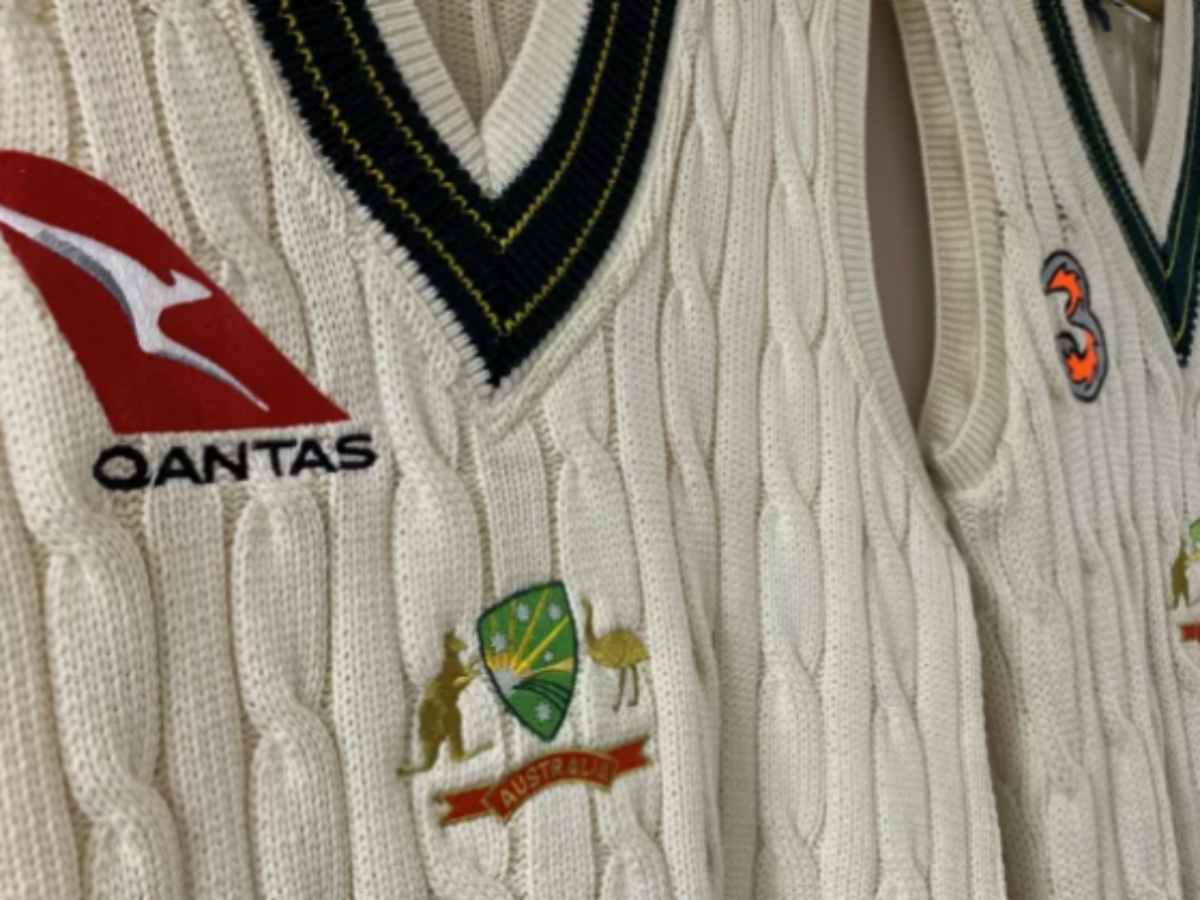Manufacturing news briefs — stories you might have missed

Silver Fleece to close – report
Adelaide media has reported the demise of the manufacturer of the cable knit jumpers (pictured) worn by Australia’s test cricket team for decades. Local In Daily reported that Silver Fleece had been wound up with liquidators appointed from Clifton Hall. The company, which employs between 10 and 50 at its Hindmarsh factory, produces school and sporting club uniforms. According to the Silver Fleece website: “For over 40 years Silver Fleece has been trusted to knit the Australian cricket team vests and pullovers, made from pure Australian wool. The same classic knits are available in your club colours, branded with your emblem.”
New Queensland manufacturing skills alliance
Manufacturing Skills Queensland and Manufacturing Industry Skills Alliance have announced a new partnership. The collaboration between MSQ and the Manufacturing Alliance is focused on attracting, retaining, and developing capability in the manufacturing sector and giving industry a voice into the skills system. According to a statement, both organisations will work closely to develop and deliver key projects aligned to the Manufacturing Alliance’s 2024 workforce plan and its role as the Jobs and Skills Council for manufacturing-related training packages. The Chief Executive Officer of MSA Sharon Robertson said: “This strategic integration of local insights and expertise offered by MMSQ will enable us to develop training packages and projects that resonate with the industry’s current and future demands, ultimately contributing to a more resilient and competitive manufacturing workforce.”
New Chairman for Austal as John Rothwell steps down
Shipbuilder Austal has announced that the company’s inaugural chairman and company founder John Rothwell is retiring from his position of Chairman to serve on the Austal board as a non-executive director. Former US Secretary of Navy Richard Spencer will replace Rothwell as Chairman and join the board of Austal USA. Rothwell was Austal Chairman for 37 years since he founded the company in 1987. During that time Austal has grown from a small, privately-owned, West Australian, commercial shipbuilder to an ASX-listed, international defence prime contractor with a multibillion-dollar orderbook, over 4,000 employees and substantial ship building operations in Australia, the United States and South East Asia. Rothwell said: “I’m incredibly proud of what Austal has achieved during my time as Chairman. I have been considering stepping back from the Chair role for a few years now, and having just turned 80 and with an excellent replacement in Richard, the time is right.”
CSO Group and xAmplify to merge
Cyber security business CSO Group and automation and AI integrator xAmplifyare to merge, creating the nation’s largest Australian-owned and operated integrator of AI, cyber security, technology and business automation services. Once complete, the merged business will serve over 110 enterprise and government organisations. The CEO and Founder of CSO Group Michael Simkovic said: “The merger of CSO Group and xAmplify will create Australia’s largest home-grown cyber security, AI and automation consulting business, with a gross turnover exceeding AU$100 million annually. We see an enormous market and growth opportunity to disrupt and challenge the traditional large global service provider models.”
CEFC seeks to measure impacts of energy transition investing
The major investor in Australia’s transition to net zero emissions, the Clean Energy Finance Corporation, has released a report as an aid to measure the emissions impact of its investments. The report, Measuring what matters: an approach for natural capital investors, sees natural capital assets as a strategic priority in investing. According to CEFC: “Crucial to this is being able to measure and monitor the emissions impact of our investments.” The report outlines consistent metrics used by the CEFC to assess both existing and potential investments and track progress in the emerging natural capital asset class. It provides practical guidance for agriculture and forestry assets on activities that can reduce, avoid or sequester emissions, ongoing monitoring and an overview of available measurement approaches and tools.
NATA’s five-year MoU with the Commonwealth
The National Association of Testing Authorities (NATA) has signed a new Memorandum of Understanding (MoU) with the Commonwealth of Australia. Under the MoU, the government recognises NATA as Australia’s national authority for the accreditation of laboratories, reference materials producers, proficiency testing providers and biobanks, and a peak authority for the accreditation of inspection bodies. The government also recognises NATA as Australia’s compliance monitoring authority of the OECD Principles of Good Laboratory Practice. The first MoU of this kind was signed in 1988, with the latest now recognising NATA as the National Authority for the accreditation of proficiency testing providers as well as biobanks. The MoU commits NATA to operate all accreditation programs including those supporting international trade, in compliance with ISO/IEC 17011, the international standard for accreditation of conformity assessment bodies.
MGA R&D head begins
Thermal energy storage system business MGA Thermal has welcomed Dr Evan Keyzer to its team as their new R&D manager. In a statement posted to Linkedin, the company said that Keyzer brings a wealth of experience from his previous role as R&D Manager at UK battery start-up, Nyobolt, “where he managed the development, scaling, and analysis of innovative battery storage materials” and “led a team of R&D professionals through the scale-up and pilot production of their proprietary energy storage technology.” Keyzer is a PhD in chemistry from the University of Cambridge specialising in material synthesis. “We are excited to have Evan onboard powering us closer to making 24/7 renewables a reality” added MGA.
Weld Australia strengthens SA presence
Industry peak body Weld Australia has announced the establishment of a new local presence in South Australia, with the appointment of Ben Mitchell as Executive General Manager, Strategic Partnerships, based in Adelaide. Geoff Crittenden, the group’s CEO, said “…South Australia will be central to delivering some of the largest and most complex defence projects ever undertaken in Australia, including building Australian conventionally armed, nuclear-powered submarines. By establishing a local presence, Weld Australia will be better positioned to serve our members and advocate for the interests of the local welding and manufacturing industries.” Mitchell’s previously held several key roles at ASX-listed welding technology company K-TIG, including Chief Executive Officer and Chief Marketing Officer.
First Graphene partners with Vector Homes
Western Australian nanomaterials business First Graphene has announced a strategic partnership agreement with UK sustainable building products company Vector Homes. According to a statement from the Australian company on Linkedin this week, the pair will “collaborate and produce sustainable construction materials”, and Vector is an adopter of First Graphene’s PureGRAPH product “to enhance strength and fire-retardancy in construction materials – which are soon to be mass produced and incorporated into residential builds.” The company added: “This is a considerable milestone for FGR as we continue to expand our global partnerships across multiple sectors, solidifying our reputation as a world-leading graphene supplier.”
Request for information on chip packaging
The Semiconductor Sector Service Bureau has announced that it is seeking information about local needs and requirements for advanced chip packaging through a survey. The S3B posted on Linkedin this week that the information will be used to inform the Advanced Manufacturing Research Facility (AMRF) in preparation for the launch of AMRF Building 2. A recent seminar on the subject — including speakers from S3B, AMRF, Taiwan’s Industrial Technology Research Institute, Archer Materials, Diraq and others — can be seen here. Those interested in contributing their views via the survey can do so here.
Bubs CFO to retire
Infant formula company Bubs Australia has told shareholders Chief Financial Officer Robin Johnston has given notice of his intention to scale back his professional commitments and resign as CFO. In a statement on Wednesday, Bubs said Johnston will remain CFO until after the release of the FY24 financial results to ensure an orderly transition, with a search underway for a successor. CEO Reg Weine said “Robin has made an outstanding contribution to the Company and our turnaround, and it has been a privilege to work with Robin since he commenced as interim Financial Officer in May 2023. Robin has established a strong finance team which will continue to provide support to the CEO, Board and Company while Bubs conducts an executive search for Robin’s replacement. We wish Robin all the best as he moves into the next phase of his life.”
New independent board for Australian Research Council
The federal. government announced that a new, independent Australian Research Council (ARC) board was appointed this week, delivering on recommendations by an independent Review of the Australian Research Council Act 2001, led by Professor Margaret Sheil. The new board will be led by Professor Peter Shergold and Professor Susan Dodds, the Chair and Deputy Chair respectively. The new ARC board, instead of the minister, will be responsible for the approval of most research grants within the National Competitive Grants Program. “I promised to end the days of ministers using the ARC as a political plaything and today, with the appointment of the new independent Board, that’s what we’re doing,” said education minister Jason Clare.The board also includes Distinguished Professor Maggie Walter, Professor Cindy Shannon, Professor Paul Wellings, Emeritus Professor Margaret Harding, Mark Stickells, and Sally-Ann Williams.
World Economic Forum release Top 10 Emerging Technologies report
This week the World Economic Forum announced publication of its annual Top 10 Emerging Technologies Report, first released in 2011 and featuring what it believes to be “technologies with the greatest potential to make a positive impact in the world in the next three to five years.” The paper also “spotlights technologies with immense potential for revolutionizing connectivity, addressing the urgent challenges of climate change and driving innovation across various fields,” according to Jeremy Jurgens, Managing Director, World Economic Forum and Head of the Centre for the Fourth Industrial Revolution. The list includes AI for scientific discovery, privacy-enhancing technologies, reconfigurable intelligent surfaces high-altitude platform stations, and integrated sensing and communication. The report can be accessed here.
Picture: Silver Fleece
Topics accreditation Austal australian research council CEFC Clean Energy Finance Corporation Clifton Hall CSO Group first graphene Jason Clare John Rothwell knitwear Manufacturing News Measuring what matters: an approach for natural capital investors Michael Simkovic NATA National Association of Testing Authorities Richard Spencer Semiconductor Sector Service Bureau Silver Fleece Vector Homes World Economic Forum xAmplify
@aumanufacturing Sections
Analysis and Commentary Awards Defence Manufacturing News Podcast Technology Videos









